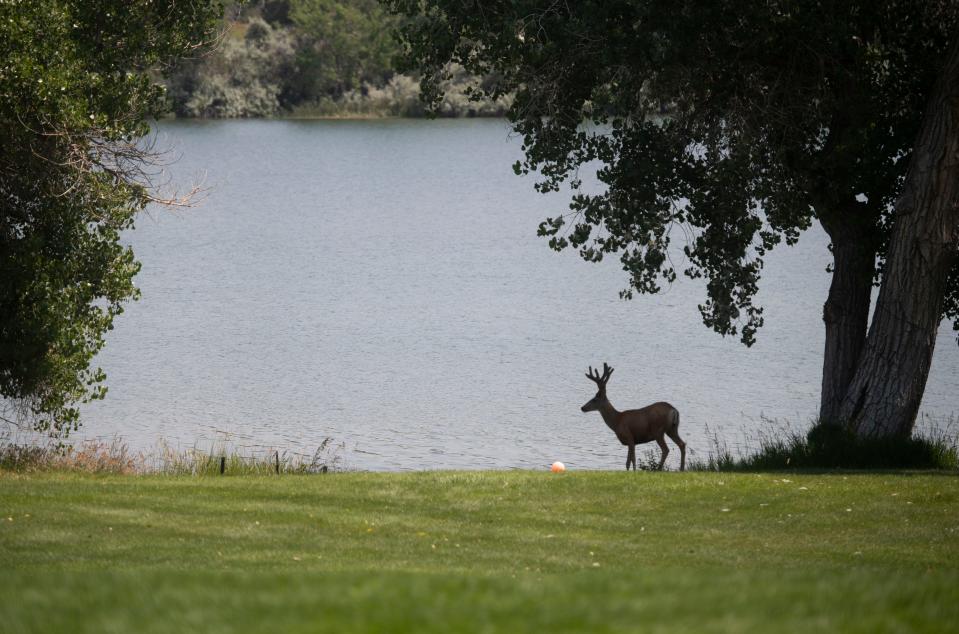Colorado officials use silly song parodies to stress importance of not feeding wildlife
Colorado Parks and Wildlife is so serious about telling people about the harmful effects of feeding wildlife that the agency has created song parodies to catch people's attention.
Think "Weird Al" Yankovic, for those old enough to remember.
The musical spin-offs of popular songs "Another Brick in the Wall" and "Never Gonna Give You Up" are being used to educate people about the importance of keeping wildlife wild and the problems associated with feeding wildlife.
The parody of Pink Floyd's "Another Brick in the Wall" starts like this:
"We don't need no human goodies. We don't need no sugar cubes. No lures to bring us to your backyard. Humans, leave them deer alone.''
The parody songs can be heard here.
"People think that feeding wildlife doesn’t negatively affect wildlife, but in reality it is irresponsible and often leads to the death of the animal being fed," Matt Martinez, a Colorado Parks and Wildlife officer in the Parker area, said in a news release. "Wildlife are well adapted to feed on natural food sources; they don’t need food from humans."
Feeding wildlife isn't only harmful. It's illegal in some cases in Colorado.

Here is what you need to know, according to Colorado Parks and Wildlife:
Colorado passed a law in 1992 that makes it illegal to intentionally place or distribute feed, salt blocks or other attractants for big game animals, which includes deer, elk, bears, moose, bighorn sheep and other animals. A violation can result in a $100 fine.
This is most common with deer. Feeding deer can attract mountain lions, whose favorite prey is deer. Attracting mountain lions can lead to killing of pets and hobby livestock. That can result in Colorado Parks and Wildlife having to kill the mountain lion if deemed a threat to humans.
It is legal to feed wild songbirds.
It is illegal to feed wild turkeys.
Some cities have feeding restrictions for squirrels and rabbits. Violations can include a fine.
Those living in the mountains, foothills and urban edges are encouraged to refrain from having bird feeders up March through November because they can attract bears. Again, if a bear is deemed a threat, that can lead wildlife officials to remove or euthanize the bear.
Human food often does not contain the nutrition birds and wildlife require, which can lead to sickness, disease and death.
Spring is when Colorado Parks and Wildlife gets inundated with 'abandoned' baby wildlife calls
Though tempting, wildlife experts agree it is normal for adult wildlife to leave their young in safe places while they go in search of food.
This is especially true when baby birds are learning to fly and found near their nests, prompting some to believe they have been abandoned, state wildlife officials said.
"Baby mammals are scentless in order to prevent predators from finding them," Janet George, retired senior terrestrial biologist for Colorado Parks and Wildlife, said in a news release. "When humans touch these animals, they are imparting them with a scent their adults will not recognize. This can result in true abandonment of healthy offspring."
Here are tips from the state wildlife agency:
Leave the animal where it is.
Keep pets out of the area.
Quietly observe the animal from a distance using binoculars and don't hover so close that the wild parents are afraid to return to the area.
If 24 hours go by and the parent does not return to the baby, it is possible the newborn was abandoned or the parent is dead. In this case, call the nearest Colorado Parks and Wildlife office. The Fort Collins office's phone number is 970-472-4300. Staff will work with a certified wildlife rehabilitation center to aid the baby if possible. Don't move the animal yourself.
For more information on how to coexist with Colorado's wildlife, visit Colorado Parks and Wildlife's Living with Wildlife site.
This article originally appeared on Fort Collins Coloradoan: Colorado uses parody songs to stress importance of not feeding wildlife

